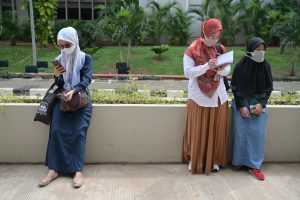On December 9, Indonesians will vote in regional elections amid a swell of coronavirus infections that shows no signs of slowing. The scale of the regional polls are staggering: more than 105 million people will vote for the leaders of nine provinces, 224 regencies, and 37 cities, from Sumatra to the Banda Islands.
The elections were initially set for September but were postponed to this week in June due to rising cases of COVID-19, largely on the assumption that the pandemic would be under control by now. Instead, the reverse has happened. The country has clocked up around 5,000 infections per day in recent weeks. As of December 7, the country’s total infection count stood at 581,550, and its COVID-19 death toll at 17,867. Both are the highest in Southeast Asia. As I’ve mentioned before, these figures almost certainly understate the spread of the disease through the archipelago, given Indonesia’s unusually low levels of testing.
The risks have prompted widespread calls for a further postponement, including from Nahdlatul Ulama and Muhammadiyah, Indonesia’s two largest Islamic organizations. “Democracy is expensive,” the Jakarta Post wrote in an editorial, “but should it cost citizens’ lives, especially during a pandemic?”
However, the government of President Joko “Jokowi” Widodo has ruled out any more delays. It has argued that a further postponement would deny people their hard-won constitutional rights and risk creating power vacuums across the archipelago. The government has pledged 5.2 trillion rupiah ($370 million) for the implementation of health protocols during the elections. These include measures to limit the number of voters in each polling station to a maximum of 500, hourly regulated voters’ attendance, and a predetermined voting schedule.
Jokowi’s administration may also have economic motivations. In a recent article, Yohanes Sulaiman of Bandung’s Jendral Achmad Yani University pointed out that spending on election logistics – as well as the mass vote-buying that typically accompanies Indonesian elections – would both function as a de facto form of economic stimulus at a time of economic stagnation. COVID-19 and its associated restrictions have pushed Indonesia into its first recession since the Asian financial crisis of 1997-98. The country saw growth fall 3.49 percent in the third quarter of the year, compared to the same period in 2019, following a 5.32 percent fall in the second quarter.
Elections don’t guarantee mass infections, but they come with seriously heightened risk. Since holding its national election on November 8, Myanmar has seen a COVID-19 surge that has pushed it up into third place for the number of infections in Southeast Asia. Meanwhile, elections in Malaysia’s Sabah State in late September are widely credited with setting of a second wave in that country. And neither of those regions is as densely populated as parts of Indonesia, especially on Java island.
The pandemic has already left its impact on the election. As Erin Cook notes over at her newsletter Dari Mulut ke Mulut, the General Elections Commission (Komisi Pemilihan Umum, or KPU) reported that 800 poll station workers have tested positive to COVID-19 in Central Java, while others have refused to be tested. As early as October, the KPU announced that three candidates had died after contracting COVID-19.
It seems likely that the pandemic will result in depressed voted turnout. In October, the local polling firm Indikator Politik Indonesia found that 47 percent of respondents were unlikely to go to the polls because of public health concerns, compared to 41 percent who said they would likely vote. The rest were undecided. In July, another survey found that 63 percent of people wanted the elections to be postponed.
What about the election itself? Perhaps the most interesting side plot is that of Gibran Rakabuming Raka, Jokowi’s eldest son. Gibran is running as mayor of Solo (Surakarta) in central Java, the post that his father used as a springboard into national politics. The president’s son-in-law Bobby Nasution is also running as a mayoral candidate in the Sumatran city of Medan, the country’s fourth-largest city. Both have won backing from the important political parties, including Jokowi’s Indonesian Democratic Party of Struggle.
The victory would put a conventional mark on the career of Jokowi, who in 2014 broke ground by becoming the first Indonesian president to come from outside the military or the country’s dense web of political dynasties. If Gibran wins the post, which is widely expected (Nasution faces a more difficult fight in Medan), it would prove that even under Indonesia’s “outsider president,” dynastic politics is alive and well.
































